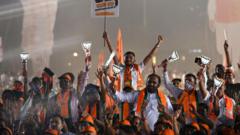Prime Minister Narendra Modi's Bharatiya Janata Party (BJP) is expected to secure a dominant position in the Maharashtra elections, with initial trends indicating a substantial lead, contrasting with the party's struggles in Jharkhand.
Modi's BJP Poised for Major Win in Maharashtra Elections

Modi's BJP Poised for Major Win in Maharashtra Elections
BJP leads trends significantly in Maharashtra, while Congress gains Jharkhand ground.
In a significant electoral development, Prime Minister Narendra Modi’s Bharatiya Janata Party (BJP) appears set to achieve a resounding victory in Maharashtra, India’s wealthiest state, based on early trends from the election. Reports suggest that the BJP and its allies are leading in nearly 220 of the total 288 seats, surpassing the necessary threshold to form a government.
Maharashtra’s capital, Mumbai, serves as the financial epicenter of India, making the state politically vital. Interestingly, while the BJP is on course to retain its stronghold in Maharashtra, it faces a potential loss in the eastern state of Jharkhand, where the opposition Congress party is projected to secure a win alongside its allies.
This election marks the first regional contest in Maharashtra since the parliamentary elections earlier this year, where Modi successfully sought a third consecutive term but lost his majority, necessitating partnerships with regional allies to maintain governance. Notably, Maharashtra was a battleground during those elections, witnessing the opposition parties claiming around two-thirds of the parliamentary seats.
Currently, the BJP governs Maharashtra in coalition with breakaway factions from two regional entities, the Shiv Sena and the National Congress Party (NCP). Political experts suggest that retaining Maharashtra is crucial for the BJP, particularly after its recent regional victory in Haryana.
The party’s spokesperson, Pravin Darekar, expressed surprise at the expected overwhelming results, indicating a positive shift for the BJP in Indian politics. With Modi steering the campaign and unveiling various welfare initiatives aimed primarily at agricultural upliftment, voters in this agriculturally rich state have received diverse promises from both the BJP and opposition parties, including loan waivers and financial aid for various demographics.
However, analysts caution that these ambitious promises could lead to fiscal strains for the new government, which must fulfill voter expectations to avoid backlash. Political instability has marked the recent history of Maharashtra, especially following defections from the Shiv Sena and NCP.
Meanwhile, Jharkhand has also faced considerable political instability, as former Chief Minister Hemant Soren was arrested on corruption charges earlier this year. Post-release, he campaigned vigorously to regain public favor, amid accusations from the BJP that he was corrupt and claims from Soren that the federal government was targeting him unjustly.
Both states witnessed parties tapping into voter incentives like cash assistance, job creation, free power, and health insurance. As the results unfold, the implications for regional politics and governance in India could be profound, shaping the landscape leading into future elections.
Maharashtra’s capital, Mumbai, serves as the financial epicenter of India, making the state politically vital. Interestingly, while the BJP is on course to retain its stronghold in Maharashtra, it faces a potential loss in the eastern state of Jharkhand, where the opposition Congress party is projected to secure a win alongside its allies.
This election marks the first regional contest in Maharashtra since the parliamentary elections earlier this year, where Modi successfully sought a third consecutive term but lost his majority, necessitating partnerships with regional allies to maintain governance. Notably, Maharashtra was a battleground during those elections, witnessing the opposition parties claiming around two-thirds of the parliamentary seats.
Currently, the BJP governs Maharashtra in coalition with breakaway factions from two regional entities, the Shiv Sena and the National Congress Party (NCP). Political experts suggest that retaining Maharashtra is crucial for the BJP, particularly after its recent regional victory in Haryana.
The party’s spokesperson, Pravin Darekar, expressed surprise at the expected overwhelming results, indicating a positive shift for the BJP in Indian politics. With Modi steering the campaign and unveiling various welfare initiatives aimed primarily at agricultural upliftment, voters in this agriculturally rich state have received diverse promises from both the BJP and opposition parties, including loan waivers and financial aid for various demographics.
However, analysts caution that these ambitious promises could lead to fiscal strains for the new government, which must fulfill voter expectations to avoid backlash. Political instability has marked the recent history of Maharashtra, especially following defections from the Shiv Sena and NCP.
Meanwhile, Jharkhand has also faced considerable political instability, as former Chief Minister Hemant Soren was arrested on corruption charges earlier this year. Post-release, he campaigned vigorously to regain public favor, amid accusations from the BJP that he was corrupt and claims from Soren that the federal government was targeting him unjustly.
Both states witnessed parties tapping into voter incentives like cash assistance, job creation, free power, and health insurance. As the results unfold, the implications for regional politics and governance in India could be profound, shaping the landscape leading into future elections.






















